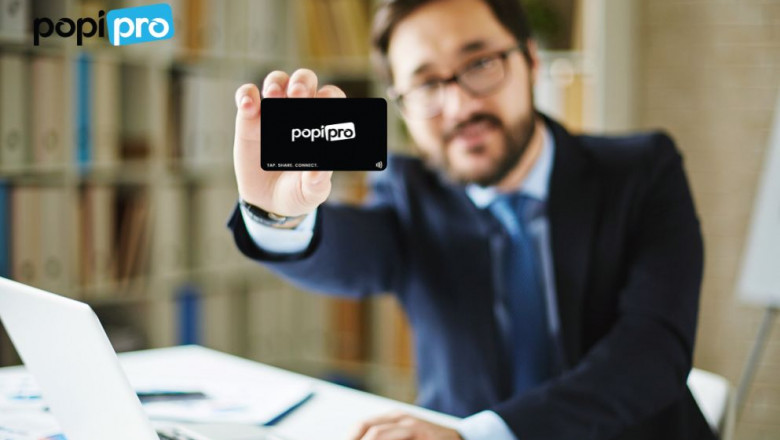views
Freelancers are constantly on the move, meeting clients, attending networking events, or collaborating on projects. In this competitive space, personal branding is critical, and the tools used to establish it can make all the difference.
One such tool is the virtual business card, which has revolutionized how professionals like freelancers present themselves and connect with potential clients.
This blog explores why cards are no longer a luxury but a necessity for freelancers and how they align with freelancing tips and the evolving need for stronger personal branding in today's market.
1. A Modern Alternative to Traditional Cards
The days of bulky, printed business cards are fading. Freelancers need solutions that align with their dynamic work styles, and smart cards fit the bill perfectly. These digital tools provide an easy, paperless way to share contact details with just a tap or scan.
Unlike traditional cards, which can be lost or damaged, virtual cards are stored securely on smartphones or cloud platforms, ensuring they’re always accessible. For freelancers, this modern and innovative approach resonates with clients who value creativity and efficiency.
**2. A Tool for Enhanced Personal Branding
Your business card is often the first impression you make, and with an NFC card, that impression is customizable and impactful. Virtual cards allow freelancers to incorporate:
- Personal logos.
- Portfolio links.
- Social media profiles.
- Testimonials and case studies.
These additions make your card a mini-portfolio that reflects your brand’s uniqueness. It’s not just about contact information anymore—it’s about storytelling. By crafting a compelling narrative, freelancers can elevate their personal branding and leave a lasting impression.
3. Simplifies Networking for Freelancers
Networking is integral to freelancing success. Whether you're attending a client meeting, a workshop, or a conference, having a business card streamlines the process of exchanging information.
You no longer have to worry about carrying enough cards or keeping track of who you gave them to. Instead, a simple QR code or NFC-enabled card lets you share your details instantly. This approach not only saves time but also makes networking smoother, which is a key takeaway in most freelancing tips.
4. Eco-Friendly and Cost-Effective
Freelancers often operate on tight budgets, and traditional business cards can become an ongoing expense due to reprints, design updates, or bulk orders. A virtual card eliminates these costs entirely.
Moreover, its eco-friendly nature aligns with modern values of sustainability, allowing freelancers to showcase their commitment to green practices—a trait increasingly admired by clients.
5. Flexibility and Scalability
Freelancers work across various industries and often juggle multiple roles. A virtual business card can be easily updated to reflect new skills, services, or achievements. For instance:
Are you a graphic designer branching into web design? Update your card with relevant portfolios.
Recently collaborated with a big brand? Highlight it instantly.
This adaptability ensures your card remains relevant no matter how your freelancing journey evolves.
6. Supports Global Networking
Freelancing often involves working with clients from different parts of the world. Physical business cards are limited in their reach, but virtual cards break these barriers. They are:
- Accessible globally with just a link or QR code.
- Shareable via email, social media, or messaging apps.
- Translatable, ensuring that your information is understood by international clients.
This accessibility fosters global networking, which is an essential component of freelancing tips for scaling a career.
7. Easy Integration with Technology
Today’s personal branding strategies rely heavily on technology. Virtual cards integrate seamlessly with tools freelancers already use, such as LinkedIn, personal websites, or customer relationship management (CRM) systems.
For example:
- You can link your card to your LinkedIn profile to showcase recommendations.
- Add a portfolio link for instant project previews.
- Use analytics to track when and how often your card is viewed.
These integrations not only enhance your professionalism but also ensure you’re staying ahead of the curve in terms of technological adoption.
8. Better Follow-Up Opportunities
One of the most challenging aspects of freelancing is maintaining follow-ups. Traditional cards often get lost in piles or drawers, but virtual cards solve this issue. They allow freelancers to:
- Add notes about the interaction directly in CRM tools.
- Automate follow-ups through integration with email marketing platforms.
- Send quick thank-you messages with links to their virtual cards.
These features make follow-ups more personal, timely, and effective—enhancing the chances of converting a lead into a client.
Conclusion,
In the fast-paced freelancing world, where first impressions and seamless connections matter, a business card is no longer optional—it’s essential. From its cost-effectiveness to its ability to amplify personal branding, this digital tool checks all the boxes.
For freelancers looking to streamline networking and showcase their value, platforms like Popipro provide customizable virtual business card solutions that perfectly align with modern demands. As freelancing continues to grow globally, investing in such tools will keep professionals competitive, connected, and unforgettable.






















Comments
0 comment